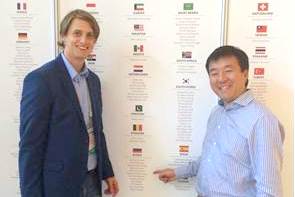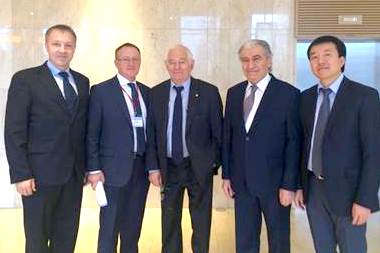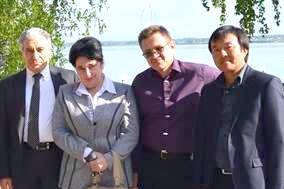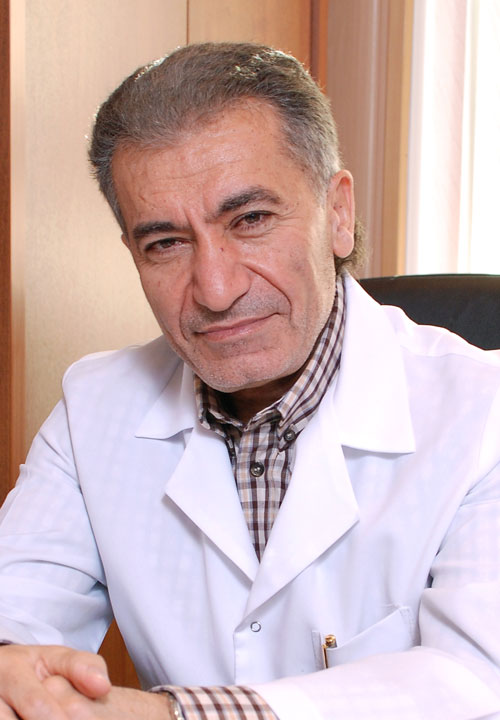Pediatric Neurosurgery Laboratory



 Prof. William Khachatryan, MD, DSc
Prof. William Khachatryan, MD, DScHead of Laboratory
.
History
The Pediatric Neurosurgery Unit of Polenov Russian Research Institute was established in 1938 by Professor I. S. Babchin. At different times, it was led by the leading figures in Russian neurosurgery: Honoured Scientist, Professor A. G. Zemskaya, V.V. Khokhlova, V. A. Rogulov, S. L. Yatsuk, Prof. V.P. Bersnev. Since 2001, Professor William Khachatryan has been the head of the department.
Today, the Pediatric Neurosurgery Laboratory is a team of qualified professionals providing solutions to the basic and applied problems of pediatric neurosurgery.
Major objectives
- Developing new technologies for the surgical treatment of brain and spinal cord tumors, including lesions occurring in the midbrain, the pons, medulla oblongata, in the region of the lateral, third and fourth ventricles, basal ganglia as well as intramedullary and extramedullary spinal tumors.
- Studying the systemic aspects of surgical treatment for hydrocephalus and various brain malformations, including arachnoid cysts.
- Studying the efficacy of treatment for cerebrovascular disease in children: arteriovenous malformations, arteriovenous fistulas, cerebral aneurysms, occlusive processes (thrombosis, vascular tortuosity, deformities, etc.).
- Developing a surgical treatment scheme for various forms of drug-resistant epilepsy.
- Studying and optimizing the surgical treatments for spinal malformations (spinal hernia, lipomas, diastematomyelia, syringomyelia, Arnold-Chiari malformation, pelvic floor disorders of myelodysplastic origin, enuresis, scoliosis and other spinal deformities with neurological deficiency).
- Differentiated surgical treatment for spastic forms of cerebral palsy.
- Studying the effectiveness of surgical treatment for injuries of plexuses and peripheral nerves, diseases and tumors of the peripheral nervous system.
- Developing the minimally invasive diagnostic methods for diseases of the central nervous system, optimizing treatment tactics and predicting outcomes based on multimodal monitoring of craniospinal compliance indicators of systemic and cerebral hemodynamics.
- Developing a surgical treatment system for non-syndromic craniosynostosis and secondary craniostenosis.
Major areas
- Surgical treatment of children with neurosurgical disorders and the creation of a scientific database for studying the patterns of oncogenesis and theranostics, epileptogenesis, cerebrospinal fluid dynamics, hemoperfusion and cerebrospinal fluid perfusion in correlation with cerebral autoregulation, which are essential both in the natural course of a disease in its subclinical stage and trigger a series of pathogenetic processes in the stage of extensive clinical manifestations (at Pediatric Neurosurgery Department No. 7 of Almazov Centre).
- Outpatient care for patients with various conditions.
- Participation in various international and Russian conferences and congresses.
The staff of the Research Laboratory developed and implemented medical technologies for the surgical treatment of hydrocephalus, brain and spinal cord malformations, drug-resistant epilepsy and brain tumors.
Research topics
- Studying the histomorphology, molecular biology of brain and spinal tumors. Developing new surgical approaches and studying the prospects of interstitial immunotherapy for malignant tumors of the central nervous system, development of nanoscale drugs for theranostics of malignant brain tumors in children.
- Studying the topographic, anatomical, histobiological features of drug-resistant epilepsy, developing new methods of surgical treatment and studying the prospects for the use of neuromodulation techniques for the treatment of drug-resistant epilepsy in children.
- Developing new minimally invasive methods for diagnosing and treating the diseases of the central nervous system, optimizing treatment tactics and predicting outcomes based on multimodal monitoring of craniospinal compliance, systemic and cerebral hemodynamics.
Training and education
- Postgraduate course on Pediatric Neurosurgery.
Shevtsov M, Multhoff G, Mikhaylova E, Shibata A, Guzhova I, Margulis B. Combination of anti-cancer drugs with molecular chaperone inhibitors. International Journal of Molecular Sciences 2019;20 (21). e5284. IF 4,183
Goryaynov S.A., Okhlopkov V.A., Golbin D.A., Batalov A., Konovalov N.A., Zelenkov P.V., Potapov A.A., Chernyshov K.A., Svistov D.V., Martynov B.V., Kim A.V., Byvaltsev V.A., Pavlova G.V., Loschenov V.B. Fluorescence diagnosis in neurooncology: retrospective analysis of 653 cases. Frontiers in Oncology. 2019. Т. 9. №FEB. С. 830. IF 2,358
Shevtsov M, Stangl S, Nikolaev B, Yakovleva L, Marchenko Y, Tagaeva R, Sievert W, Pitkin E, Mazur A, Toltoy P, Galibin O, Ryzhov V, Steiger K, Smirnov O, Khachatryan W, Chester K, Multhoff G. Granzyme B functionalized nanoparticles targeting membrane Hsp70-positive tumors for multimodal cancer theranostics. Small. 2019;15 (13):e1900205. IF 10,856
Shevtsov M, Pitkin E, Ischenko A, Stangl S, Khachatryan W, Galibin O et al. Ex vivo Hsp70-activated NK cells in combination with PD-1 inhibition significantly increase overall survival in preclinical models of glioblastoma and lung cancer// Frontiers in Immunology. 2019;10:454. IF 6,429
Sysoev K., Tadevosyan A., Samochernykh K., Khachatryan W. Prognosis of surgical treatment of the tethered cord syndrome in children. Child's Nervous System. 2018. Т. 34. № 2. С. 305-310. IF 1,320
Shevtsov M, Gao H, Multhoff G. Membrane heat shock protein 70 (Hsp70) a theranostic target for cancer therapy. Philosophical Transactions B. 2018;373:1738. IF 6,139
Shevtsov M, Zhou Y, Khachatryan W, Multhoff G, Gao H. Recent advances in gold nanoformulations for cancer therapy// Current Drug Metabolism. 2018;19 (9):768-780.IF 2,976
Mamatkhanov M.R., Abramov K.B., Lebedev K.E., Khachatryan W.A. Reoperation after failure of epilepsy surgery in children. Epilepsia. – 2018. – Vol. 59, suppl. 3. – P. 104.IF 5,562
Abramov K.B., Khachatryan W.A., Mamatkhanov M.R. et al.Predictors for surgical treatment outcome during the first year follow‐up period in children with temporal lobe epilepsy // Epilepsia. – 2018. – Vol. 59, suppl. 3. – P. 106.IF 5,562
Shevtsov M, Multhoff G. Immunological and translational aspects of NK cell-based antitumor immunotherapies. Frontiers Immunology. 2017;7:492. IF 6,429
